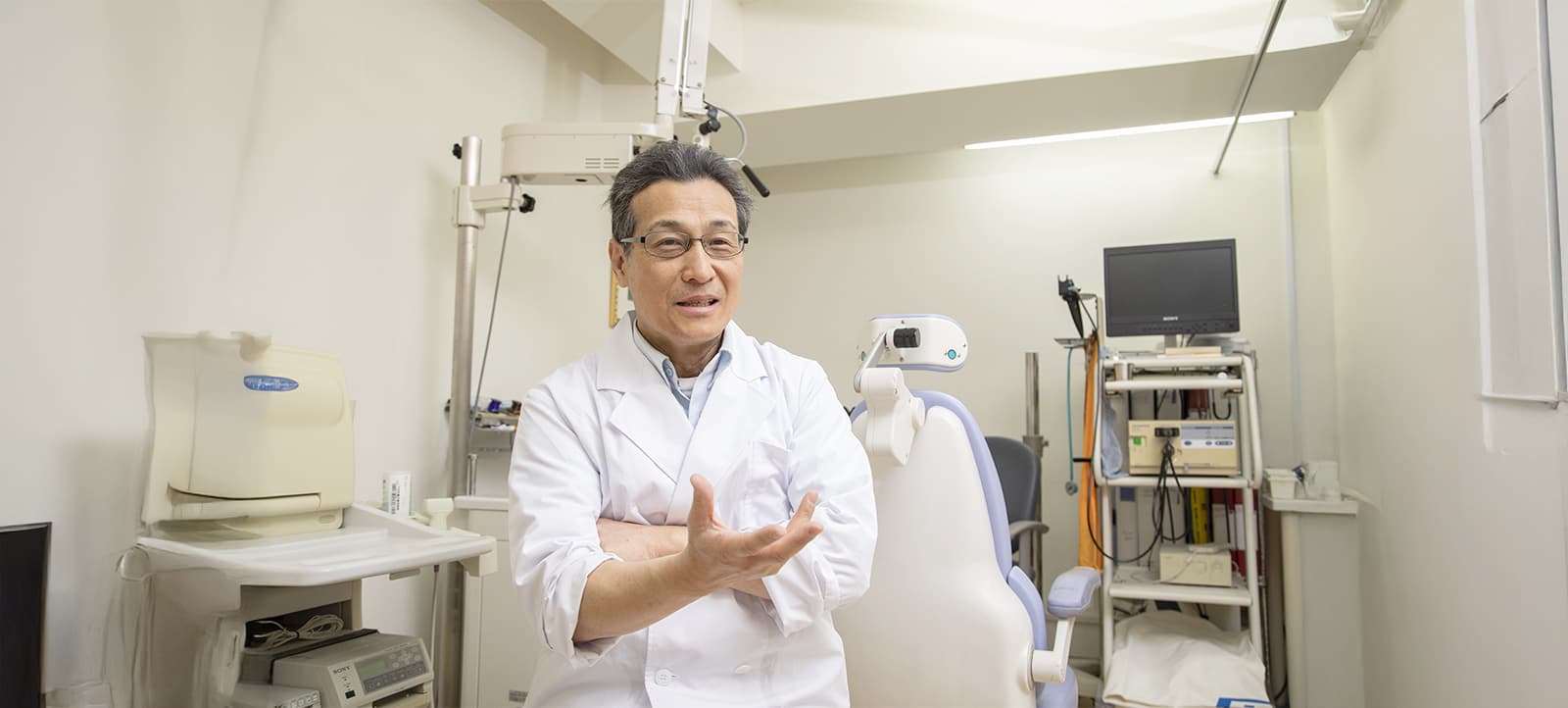My History
At our clinic, we specialize in otolaryngology, focusing on care that closely resembles emergency medicine. While the ENT field includes subspecialties like voice clinics that focus on vocal health, my personal focus is on early-stage diagnosis and intervention. For example, during a throat examination using a scope, we may detect signs of lung cancer beyond the vocal cords. In some cases, patients who come in complaining of dizziness are later found to have brain tumors. This role—providing care at the very earliest stage of illness—is how I see my daily work with patients.
But I didn’t start my career as a physician. My professional life began at Sumitomo Heavy Industries, where I was involved in projects such as particle accelerators using electron and proton beams. I also played a role in launching the company’s electron beam sterilization business for medical equipment. Back then, I believed that the value we created for society should translate into financial returns. That income helped sustain not only the people within the company but their families as well—ultimately supporting human life. That was the motivation behind my work.
My path toward medicine began with a suggestion from my wife. She told me she felt I was better suited to a career focused on contributing to society more broadly, rather than one rooted solely in corporate profit. I wasn’t sure at first, but I’ve never been rigid about the form of my contributions—as long as I could help others, I was open to change. I chose to trust her insight. I believe that living for the sake of others and for the greater good is deeply important. And out of the many possible paths I could take, I decided to pursue medicine. Being a doctor means caring for patients with love and treating them with a deep sense of responsibility. With that belief, I left my job, prepared for the medical school entrance exam, and set out on the path to becoming a physician.
The Present
In my daily practice, I always strive to deliver care that is truly centered on you. During the COVID-19 pandemic, there was a strong focus on others—on not spreading the virus or figuring out who it came from. But to me, the most important thing is simple: you need to get better. Your well-being, here and now, is what matters most. That belief continues to guide every decision I make as a physician.
I also have a background in surgery, where treatment is typically done as part of a team. Surgical teams rely on clear communication and shared decision-making. In contrast, ENT care is often performed by a single doctor. Because of my surgical experience, I take a more open and collaborative approach. I make sure patients understand exactly what’s happening in their body and where—so they’re not just being treated, but truly informed.
During my time in surgery, I witnessed the passing of many patients. That experience made me realize a deep contradiction in medicine: we know we can’t save people forever—death is part of life—but we still have to give everything we have to help. That understanding led me to believe that our mission is to help people live as happily and meaningfully as possible for as long as they can. To me, medicine is about supporting each person’s happiness and improving their quality of life. ENT doesn’t often involve life-or-death emergencies, which is exactly why I believe our role is to help people keep living well—and help them return to their daily lives as quickly as possible. That’s why I’m passionate about early intervention, from mild symptoms to the early stages of serious conditions. My goal is always the same: to help each patient live a better, happier life. For that reason, our clinic is committed to treating any symptoms that occur above the neck—we want to be a place where people can come for help, no matter the issue.
For the Future
At the heart of my philosophy is the belief that medicine should offer peace of mind—and that love for others is its foundation. Of course, the reality is that every person will one day pass away. Accepting that truth, I want to continue pursuing a kind of medical care that helps each person live a life they can look back on and say, “I was happy.”
That ideal, however, stands in stark contrast to what I see as a growing problem in today’s healthcare system: medicine is increasingly being positioned at the center of the economy. I find it troubling that healthcare is now often treated as an economic driver. This shift became especially clear during the COVID-19 pandemic. In Japan, we saw a pattern take hold—first came the emergence of the virus, followed by alerts from medical institutions, widespread media coverage, promotion of vaccines, and financial aid for older adults. Yet throughout this process, there was little discussion rooted in natural science: few asked whether each step was truly necessary or examined the actual routes of transmission. Instead, economic considerations seemed to move faster than scientific ones.
When medicine becomes overly focused on economics and the goal is to protect the majority, I worry that we may end up sacrificing the well-being of individual patients. Rather than providing peace of mind, I fear that medicine, especially during the pandemic, may have contributed to widespread anxiety. That’s why I believe our focus must return to the individual patient—the person right in front of us. I hope that, in the future, this kind of patient-centered care becomes the global standard. I want to see medical care that is guided by compassion and a desire to bring happiness—not only in Japan, but around the world. With that belief firmly in mind, I will continue to care for each and every patient with sincerity and move forward in this mission.
